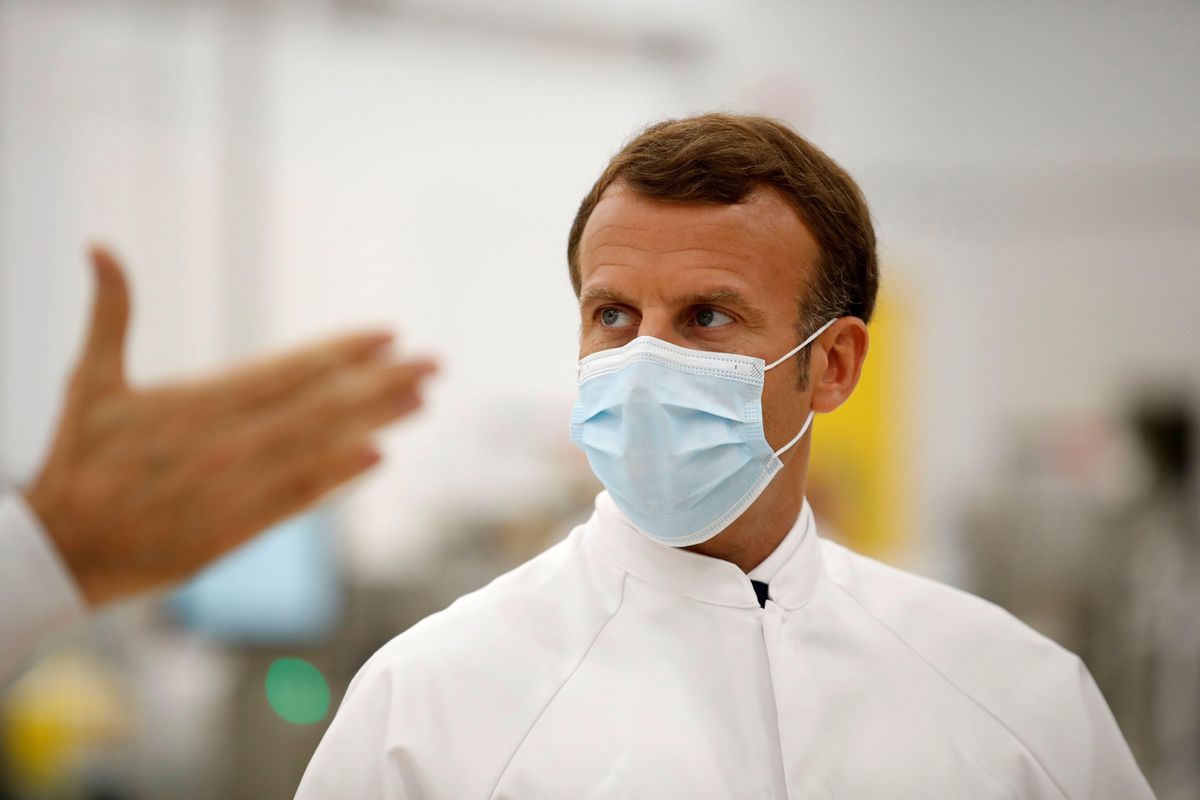[ad_1]

French President Emmanuel Macron, wearing a protective face mask, listens to researchers as he … [+]
In my Christmas missive (link below) I sketched out a number of ‘surprise’ events that might occur in 2021, one of which was that
‘As part of its policy of ‘national strategic autonomy’ France opts to favour two French made vaccines for its citizens, but adverse reactions lead to a health and political crisis. Emmanuel Macron’s standing drops in the opinion polls, and the French establishment search for a centre right candidate for 2022’.
Though I wrote the note under the jovial banner ‘Drinking with Dickens’, I have to adhere to the first rule of forecasting which is to loudly take credit for any prediction that is mildly correct.
France under pressure
France, like much of the EU, is struggling to distribute COVID vaccines and shows little sign of lifting lockdown restrictions. To be fair, much of the blame for the slow rollout of vaccines rests with the odd modus operandi of Ursula von der Leyen’s cabinet.
The French situation is however compounded by Emmanuel Macron’s attack on the Astrazeneca/Oxford vaccine, 1 million vials of which lie unused in France, and by the failure so far of French scientists and pharmaceutical companies to speedily come up with a French ‘cure’ like that of fusty old Oxford (by the way Oxford has 72 ‘affiliated’ Nobel Prizes to 70 for France).
In the end it looks like Europe’s quest for ‘strategic autonomy’ (a French concept) and its admirable desire to implement a European solution to the vaccine problem, that got in the way. This unity is now crumbling – small, states Austria and Finland want to join forces with Israel, and Italy has intervened to stop the export of vaccines to Australia. As with the initial months of the COVID crisis, countries are beginning to fail the ‘solidarity’ text, which is not a great sign for the international order.
COVID trials
All of this begs at least two questions – do we yet have any sense as to what ‘type’ of country has managed to best deal with the COVID crisis, and second what the political implications and fallout of COVID (especially for Emmanuel Macron) are.
First, at the beginning of the crisis it seemed that countries that had experienced a pandemic in the recent past (Asia), and those with robust social democracies (small, advanced economies and Germany) dealt best with the fallout from the coronavirus, whilst the Anglo-Saxon countries (and diverse others) did less well. The UK and the US, together with Israel and the UAE of course, have now done much better with vaccination programs.
This disparity in performance, with countries like India confusing the picture even more, will try policy students for some time. One of the better explanations I have heard is from David Skilling who makes the distinction between liberal market economies (LMEs) and coordinated market economies (CMEs). LMEs use decentralised, competitive and flexible market mechanisms; CMEs rely more on established informal, relational arrangements between a range of stakeholders. In that context, the liberal market economies were quicker to organise supplies of vaccines and to distribute them.
We could spend a great deal of time debating which model is better – but it is a redundant conversation because changing a country from an LME to an CME, takes a great deal of time, and to quote the Skilling paper the race against COVID is a marathon, not a sprint’
What is more pertinent is how countries are set up for the next challenges – the potential for political unrest amidst enduring lockdowns (uncharacteristically Ireland witnessed a small but violent ‘anti-lockdown’ protest last week), the possibility of a large number of broken small businesses, the need to rethink how healthcare services can be made flexible, more focused on mental health and better funded on a permanent basis, and how the ‘scramble’ I referred to last week where numerous countries are chasing strategic assets, will distort supply chains and inevitably lead to new disputes.
Le Pen a risk
Given that task list, who would be a politician? Back to my speculative comment on Macron. First, I find that commentators outside France regularly overestimate the chances that he might be de-throned, and that Marine Le Pen might take his place. In my view Macron’s greatest failing during the COVID crisis (and most leaders have been tripped up by it) is his failure to be ‘close’ to the French people during the crisis to the extent that his ‘Jupiterean’ stance may become a liability.
To that end, if he is displaced (I don’t think so) it will not be someone from the right (General de Villiers, Philippe Juvin or Le Pen) but rather a centrist who is more avuncular (Edouard Philippe or Michel Barnier). On the left, my bet is that their leading candidate will be Annie Hidalgo as a modernising/eco/egalitarian candidate. There is still lots of time to go till the next French election, but in the light of the post-Merkel world, it will matter hugely for Europe.
Democracy under threat
On a broader landscape, by the time we get to mid 2022, the political topics that preoccupy us will be changing. While tackling inequality (especially in the US) will be prominent, politicians and societies will be dealing with an environment that is ‘the opposite of confinement’ in the sense of people’s desire to socialise and travel, the potential headwinds of higher interest rates and higher prices, and ongoing challenges to the democratic model (Freedom House’s latest report highlights just how vulnerable democracy is).
On that note, my credit goes to the French judiciary who have now tried and passed sentence on two of the previous three presidents, and in doing so uphold the credibility of the republic. Other countries might examine this example when it comes to the conduct of their (former) presidents and prime ministers.
[ad_2]
